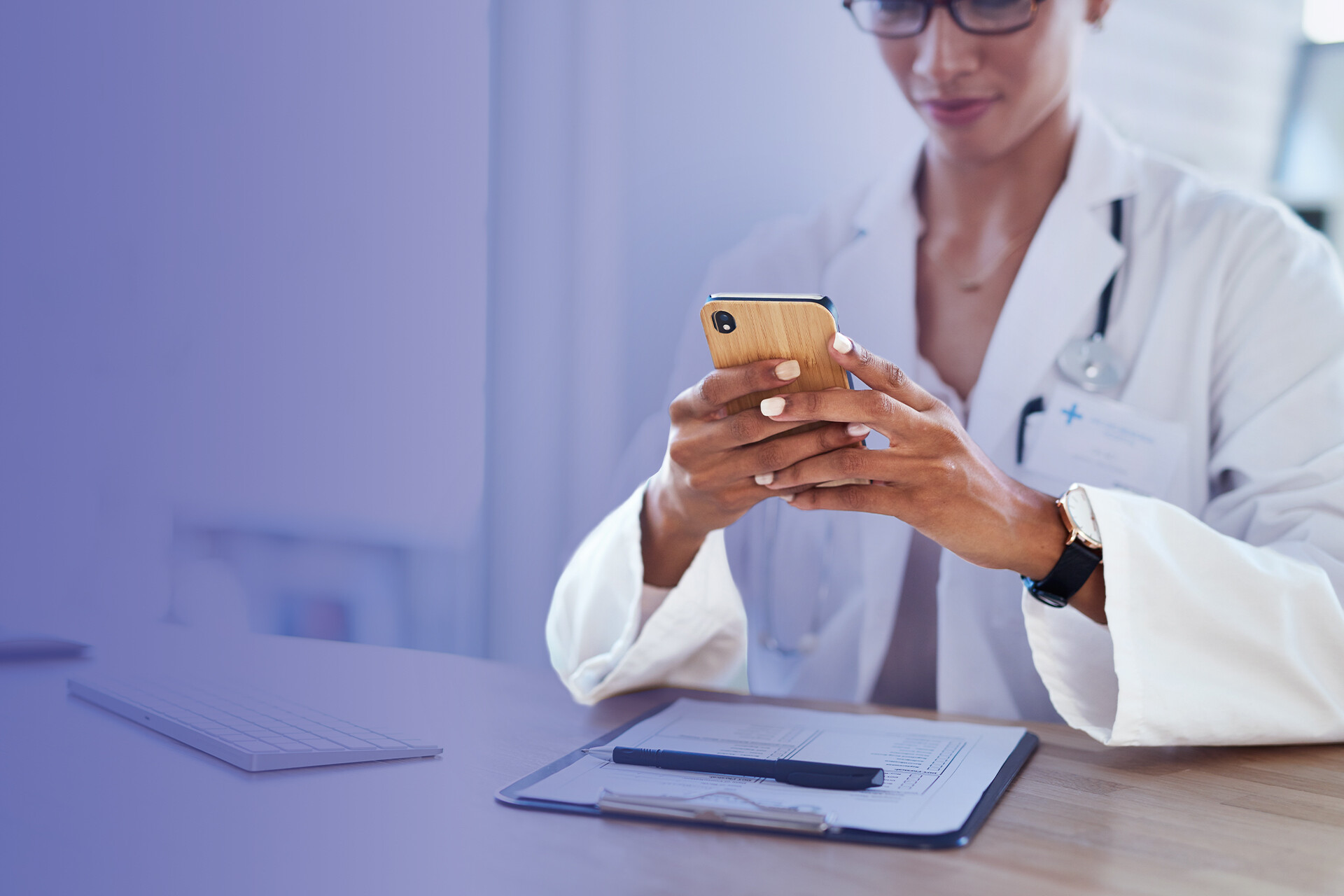Think you’ve seen it all in the healthcare industry? Think again. The digital revolution is just getting started, and it’s transforming the way hospitals operate. From telemedicine to AI diagnostics, the future is now—and it’s digital.
In this guide to healthcare mobile apps trends, we will discuss:
- Tech’s Role in Healthcare: Why it’s a game-changer.
- Hospital Software Development: The heart of this post.
- Emerging Trends: Telemedicine, EHR, AI, and IoT.
- Real-World Impact: Cases that prove the point.
- Industry Challenges: Data security, compliance, and more.
- Expert Insights: Tips from our own tech wizards.
- Success Stories: Our projects that made a difference.
- Positive Outcomes: Better care, smoother operations.
- Future Predictions: What’s next in the pipeline.
- Emerging Tech: Blockchain and AI’s untapped potential.
P.S., If you’re curious about healthcare apps inside your own practice, consider partnering with Miquido. We understand quality of care, electronic medical records management, and patient-doctor communication to deliver word-class healthcare mobile app development to streamline your practice.
The Digital Revolution in Healthcare: Why Technology is a Game-Changer
You’ve heard the buzzwords—telemedicine, AI, IoT—but do you know what they really mean for healthcare? We’re talking about a seismic shift, a revolution that’s redefining patient care and operational efficiency.
Gone are the days when medical records were stashed in dusty file cabinets and appointments were booked over the phone. Welcome to the era of digital healthcare.
The Stats Don’t Lie
According to a recent report, the global healthcare IT market is expected to reach USD 857.58 billion by 2030. That’s not just a number; it’s a testament to the transformative power of technology.
The Big Picture
- Efficiency: Streamlined operations mean more time for patient care.
- Accessibility: Remote consultations are breaking down geographical barriers.
- Data-Driven: Real-time analytics for informed decision-making.
- Patient-Centric: Tailored care plans and seamless user experiences.
No revolution comes without its challenges. Data security, regulatory compliance, and system interoperability are just a few. But for every problem, there’s a solution waiting to be developed.
If you’re looking for a partner to navigate these waters, Miquido turns bottlenecks at your practice into user-friendly healthcare solutions. From ideation to launch, we’re with you every step of the way.
All Eyes Are On Hospital Software Development
So, what’s the big deal about hospital software development? In a nutshell, it’s the engine that powers this digital revolution in healthcare. We’re talking about software that not only streamlines administrative tasks but also enhances patient care in ways you’ve never imagined.
The Core Components
- Electronic Health Records (EHR): Say goodbye to paper trails. EHRs digitize patient information (e.g., blood pressure, symptoms, etc.), making it accessible and shareable among top healthcare providers.
- Telemedicine Platforms: Virtual consultations are now as effective as in-person visits, thanks to high-quality video conferencing and real-time data sharing.
- AI-Powered Diagnostics: Machine learning algorithms can analyze medical data to assist in diagnosis and treatment plans.
- IoT in Healthcare: Wearables and sensors provide continuous health monitoring, sending alerts for any irregularities.
Why It Matters to You
If you’re a healthcare CEO, IT manager, or investor, this is your golden ticket. Implementing cutting-edge software solutions can drastically improve patient satisfaction, operational efficiency, and yes, your bottom line.
- Reduced Operational Costs: Switching to digital platforms can cut down on manual labor and administrative costs for healthcare professionals. For example, automated billing systems can save your staff hours of manual work, translating into cost savings.
- Enhanced Data Security: With the right software, you can ensure that patient data is encrypted and securely stored. This not only builds trust but also keeps you compliant with regulations like HIPAA.
- Improved Patient Engagement: Features like appointment reminders and health trackers can keep patients engaged and accountable for their health. The more engaged the patient, the better the outcomes.
- Data-Driven Decisions: Real-time analytics can provide invaluable insights into patient behavior and treatment efficacy in the healthcare sector. For instance, if a particular treatment shows low success rates, you can pivot quickly, saving both time and resources.
Tech That’s Taking the Healthcare Industry By Storm Right Now
The healthcare services landscape is buzzing with innovation, and it’s not just about flashy gadgets. We’re talking about groundbreaking healthcare mobile apps trends that are reshaping the very fabric of healthcare. Let’s dive in and explore what’s hot in the world of hospital software development.
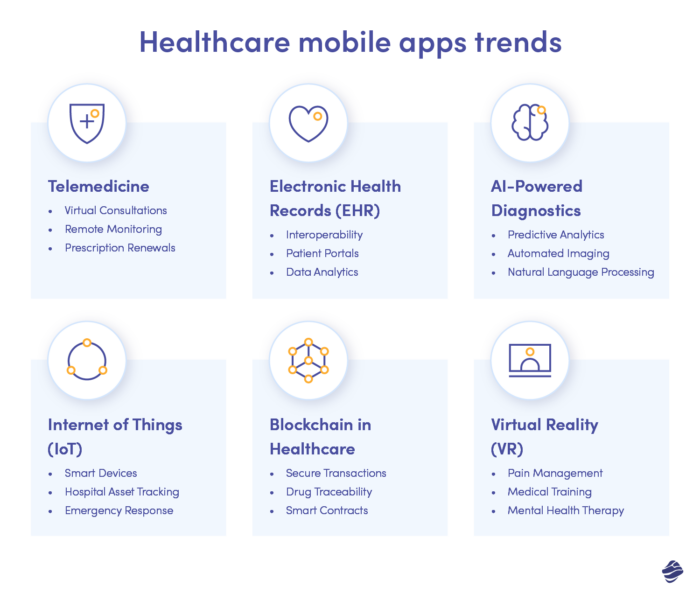
Telemedicine: The New Normal
- Virtual Consultations: No more waiting rooms. Patients can consult with healthcare providers from the comfort of their homes.
- Remote Monitoring: Wearable devices can send real-time health data to medical professionals, enabling timely interventions.
- Prescription Renewals: Telemedicine allows for quick and secure prescription renewals, eliminating the need for in-person pharmacy visits.
Teladoc Health, for example, is a leader in this space, offering 24/7 access to certified healthcare providers through video consultations, making healthcare more accessible than ever.
Electronic Health Records (EHR): Beyond Paper
- Interoperability: EHR systems can integrate with other platforms, making it easier to share information across different healthcare providers.
- Patient Portals: These offer patients secure access to their medical history, lab results, and even allow them to book appointments.
- Data Analytics: Advanced EHRs come with analytics tools that help healthcare providers identify trends and make informed decisions.
Platforms like DocResponse, for instance, provide an end-to-end solution for healthcare providers by integrating EHRs and telemedicine capabilities to communicate with patients and manage appointments much easier.
AI-Powered Diagnostics
- Predictive Analytics: AI can analyze past patient’s large amounts of data to predict future health risks. Imagine knowing the likelihood of a patient developing a condition before it happens.
- Automated Imaging: AI algorithms can quickly analyze X-rays and MRIs, freeing up radiologists to focus on more complex cases.
- Natural Language Processing: AI can sift through medical literature and patient records, helping doctors with diagnosis and treatment options.
IBM’s Watson Health uses AI to assist in diagnosing and treating diseases, offering doctors a powerful tool to improve patient outcomes.
IoT in Healthcare to Always Stay Connected
- Smart Devices: Think insulin pumps that automatically adjust dosage based on real-time blood sugar levels.
- Hospital Asset Tracking: IoT sensors can track the location of medical equipment, reducing time spent on locating vital resources.
- Emergency Response: Internet of Things (IoT) can facilitate quicker emergency responses through smart ambulances equipped with real-time monitoring systems.
Medtronic’s IoT-enabled insulin pumps provide real-time glucose monitoring and automatically adjust insulin levels, offering a new level of freedom and control for diabetes patients.
Blockchain in Healthcare (The Trust Factor)
- Secure Transactions: Blockchain can securely and transparently track all types of transactions, from patient records to billing.
- Drug Traceability: It can also be used to trace the production and distribution of pharmaceuticals, ensuring authenticity and safety.
- Smart Contracts: These self-executing contracts with the terms directly written into code can automate insurance claims, making the process more efficient.
MedRec, a blockchain-based system, offers secure and transparent medical record management. It not only ensures data integrity but also simplifies the consent management process between different providers.
Virtual Reality (VR) in Healthcare
- Pain Management: VR can distract patients during painful procedures, reducing the need for painkillers.
- Medical Training: Surgeons and medical students can practice procedures in a risk-free, virtual environment.
- Mental Health Therapy: AR VR can simulate environments to treat conditions like PTSD and anxiety disorders.
Invivo VR is revolutionizing medical training by offering realistic, immersive environments where medical professionals can hone their skills without any risk to patients.
Intrigued by these healthcare mobile app trends? We’ve got the expertise to bring them to life. Miquido specializes in developing cutting-edge healthcare software that’s aligned with these emerging trends. From telemedicine platforms to artificial intelligence (AI) diagnostics, we’ve got you covered.
The Biggest Industry Challenges
You’re jazzed about the digital healthcare revolution, but hold your horses. There are some serious challenges that could throw a wrench in your plans. Let’s roll up our sleeves and dig into the nitty-gritty.
Data Security: The Elephant in the Room
Data security. It’s the looming cloud on a sunny day. Cyberattacks are skyrocketing, and healthcare data is a prime target. One slip-up, and you’re not just facing legal headaches; you’re eroding hard-won patient trust.
- Unauthorized Access: Think rogue employees or hackers gaining access to sensitive patient data. It’s not just a breach; it’s a PR nightmare.
- Ransomware Attacks: Imagine your entire healthcare system held hostage. Vital patient data, inaccessible until you pay up. It’s happening, and it’s terrifying.
Navigating healthcare regulations is like walking through a minefield blindfolded. One wrong step, and boom! You’re not just looking at fines; you’re risking your reputation.
- HIPAA Compliance: This U.S. law is a beast. Fail to comply, and you could be looking at penalties up to $1.5 million per year.
- GDPR: Operating in Europe? Then you better get cozy with GDPR regulations, which can impose fines up to €20 million or 4% of annual global turnover.
Interoperability: The Missing Link
Different systems, different formats, and a whole lot of chaos. Interoperability is the dream, but we’re not there yet.
- System Compatibility: Ever tried to fit a square peg in a round hole? That’s what it’s like integrating different healthcare systems.
- Data Silos: Information trapped in one department can’t help another. It’s like having a puzzle with pieces locked in different rooms.
User Experience: More Than Just Pretty Buttons
A clunky interface can turn even the most patient user into a ticking time bomb. User experience isn’t just about aesthetics; it’s about functionality.
- Intuitive Design: If a user needs a manual to navigate your app, you’ve already lost.
- Accessibility: Not everyone is tech-savvy. Your platform needs to be accessible to all, from tech novices to the digitally fluent.
Cost of Implementation: The Pricey Elephant
Let’s talk money. High-quality software doesn’t come cheap, and neither does its implementation. It’s a significant investment, and you’ve got to be prepared for it.
- Initial Costs: Customizing software to fit your healthcare institution’s unique needs can be a costly affair. And that’s before you even consider training staff.
- Ongoing Maintenance: Software isn’t a one-and-done deal. Regular updates and maintenance can add up, affecting your bottom line.
Scalability: The Growing Pains
As your healthcare organizations grow, so do your tech needs. Scalability isn’t just a buzzword; it’s a necessity.
- Infrastructure Limits: Your current IT infrastructure might not be equipped to handle increased loads, leading to performance issues.
- Data Management: More patients mean more data. Can your current system handle it, or will it crumble under the pressure?
Ethical Considerations: The Moral Compass
Last but not least, let’s talk ethics. From data privacy to equitable access, ethical considerations in healthcare tech are a minefield.
- Data Ownership: Who owns the patient data? Is it the healthcare provider, the patient, or maybe the software vendor?
- Equitable Access: Not everyone has access to the latest smartphones or high-speed internet. How do you ensure your tech solutions are accessible to all?
Feeling daunted by these challenges? Take a deep breath. At Miquido, we’ve got the expertise to guide you through this maze of healthcare app development. From cost-effective solutions to ethical tech, we as a healthcare software development company have got your back.
Thinking Of Your Own Healthcare App? Consider These Tips.
You’ve seen the healthcare app trends in healthcare industry, you’ve weighed the challenges, but what’s the inside scoop? We’ve tapped into our own pool of tech wizards to give you some golden nuggets of wisdom. Trust us, you’ll want to jot these down.
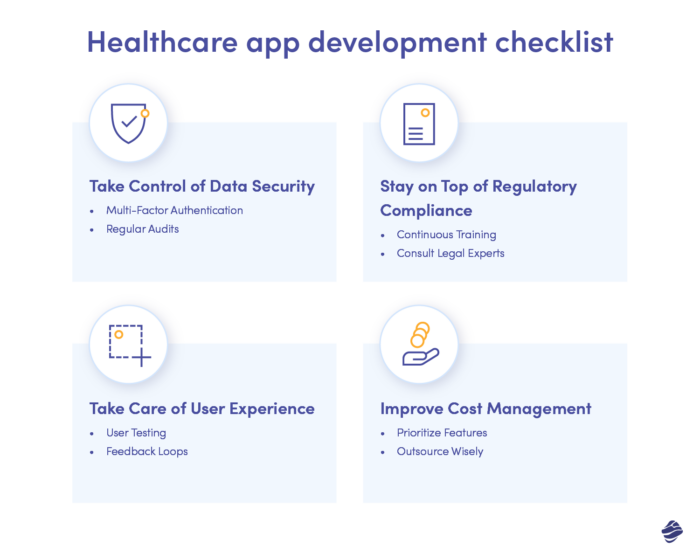
Taking Control of Data Security
Our experts can’t stress this enough: think of your data as a treasure trove that needs a dragon for protection.
- Multi-Factor Authentication: It’s like having a secret handshake. Make sure only authorized personnel can access sensitive data.
- Regular Audits: Think of it as spring cleaning. Regularly audit your systems to identify and patch vulnerabilities.
Staying on Top of Regulatory Compliance
Don’t just meet the minimum requirements; aim to exceed them. It’s better to be safe than sorry.
- Continuous Training: Laws change. Keep your team updated with regular compliance training sessions.
- Consult Legal Experts: Don’t guess; know. Consult healthcare compliance lawyers to ensure you’re on the right track.
On User Experience: Don’t Make Them Think
The best interface is one that’s so easy to use, it feels like second nature.
- User Testing: Don’t assume; ask. Conduct regular user testing to identify pain points in your interface.
- Feedback Loops: Keep the lines of communication open. Use feedback loops to continually improve the user experience.
Cost Management
Costs can spiral out of control if you’re not careful. Our experts recommend a balanced approach.
- Prioritize Features: Not all features are created equal. Focus on what’s essential and build from there.
- Outsource Wisely: Some tasks are better left to experts. Know when to keep things in-house and when to outsource.
Our tech wizards are the backbone of our success at Miquido. From crafting secure systems to designing user-friendly interfaces, we’ve got the expertise to make your healthcare software project a resounding success.
Looking At Healthcare Application Development In Action
You’re not just here for the healthcare mobile app trends and challenges, right? You want to see results. And we’ve got them. Let’s dive into some of our success stories that have revolutionized healthcare through cutting-edge software solutions.
Smart Reporting
We developed a tool that optimizes radiologists’ workflow, allowing them to save time on reports. This tool has automated internal data organization, making the most of the obtained information.
The software helped:
- Enhance Productivity: Radiologists were able to produce more reports within the same timeframe, enhancing hospital/clinic efficiency.
- Reduce Errors: Automated data organization minimized human errors, leading to more accurate and reliable reports.
- Save Time: Significant reduction in the time taken for radiologists to draft and finalize reports.
- Improve Data Utilization: The software maximized the use of available data, ensuring no valuable insights were overlooked.
Salve
An innovative healthcare platform that improves the patient experience by providing constant support and information. We enhanced Salve’s main page and subpages with custom animations and responsive web design.
What did that do?
- Improved User Engagement: Custom animations led to longer user session durations and higher engagement rates.
- Increased Accessibility: Responsive web design ensured that patients could access the platform seamlessly across various devices, including mobiles, tablets, and desktops.
- Continuous Support: Patients felt more supported and informed, leading to increased trust and satisfaction.
- Higher Retention Rates: With enhanced user experience, there was a noted increase in recurring patient visits to the platform.
Which?
We designed a data pipeline to process information on elderly care facilities. The ETL pipeline supports the process of obtaining data, operations on large databases, and their efficient aggregation and search. This project supports conscious consumer choices and raises awareness of consumer rights.
The benefits:
- Data Centralization and Quality: Unified data from multiple sources in one place, ensuring accuracy and reliability for consumers.
- Efficient Data Analysis and Reporting: Streamlined data structure allowed for faster insights and comprehensive reports on elderly care facilities.
- Enhanced Search Capability: Optimized data facilitated quicker, more accurate searches, aiding consumers in finding relevant information effortlessly.
- Scalability: Designed to handle vast data volumes, ensuring consistent performance even as the platform grows.
- Informed Decision Making: Accurate, organized data empowered consumers to make better choices regarding elderly care facilities.
- Awareness and Education: Efficient data processing bolstered “Which?” efforts to educate about consumer rights and provide data-driven insights.
NiFi
We took on a unique project called NiFi aimed at promoting health awareness in less prominent areas of Nicaragua. This initiative provides free WiFi access in national hospitals. But here’s the catch: a user can connect for 30 minutes only after reading a quick article on a healthcare challenge and taking a short test.
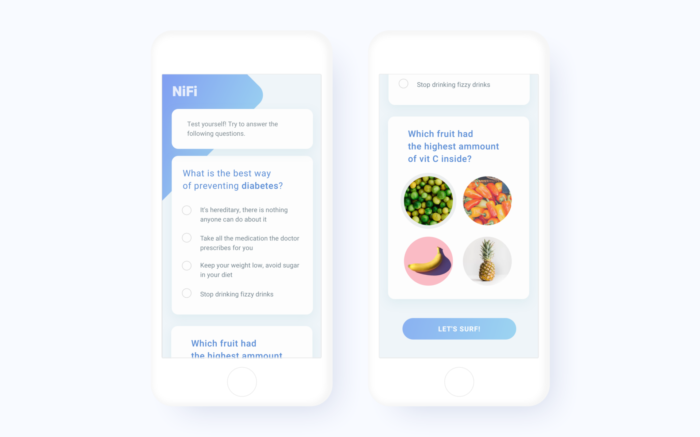
The Impact:
- Promote Health Awareness: The initiative educates the public on various healthcare issues.
- Data Collection: User data is recorded for future educational content.
- International Collaboration: A joint effort between Poland, the UK, and Nicaragua.
Pando
Pando is a game-changer in healthcare communication. Developed by Miquido, this app simplifies the information flow between hospital staff, giving them more time for what truly matters: patient care. This had been particularly beneficial during the Covid-19 pandemic when efficient communication was more critical than ever.
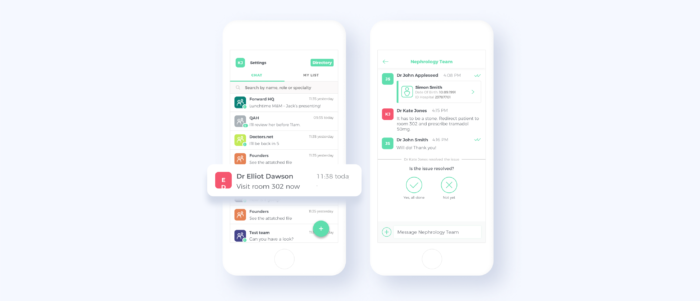
The Results:
- Time-Saving: Saves healthcare practitioners up to an hour daily.
- Effective Communication: Streamlines information flow among hospital staff.
- Seed Funding: Raised $3.9 million in seed funding, underscoring its potential.
Looking to integrate something similar into your practice? Reach out today for a free consultation where we’ll discuss what’s holding your practice back and how we can fill those gaps with Healthtech.
What’s Next in the Future of The Healthcare Industry?
You’ve got the lay of the land, but what’s on the horizon? Buckle up, because the future of healthcare tech is a rollercoaster of innovation. Let’s peek into the crystal ball.
Blockchain
Blockchain isn’t just for crypto anymore. It’s poised to revolutionize healthcare data management.
- Secure Transactions: Think of it as an impenetrable vault for patient data.
- Traceability: Every data change is recorded. That’s accountability on steroids.
- Smart Contracts: Automate administrative tasks and cut out the middleman. Efficiency, here we come.
- Patient Consent Management: A transparent, immutable record of who can access what. No more consent form mix-ups.
Augmented Reality: More Than Just “Games”
AR is stepping out of the gaming world and into the OR.
- Surgical Planning: Imagine mapping out a surgery in 3D before making the first incision.
- Medical Training: It’s like a flight simulator for doctors. Real-world practice without real-world risks.
Voice-Activated Systems: Talk and It Shall Be Done
Voice tech is making waves, and healthcare is ripe for the picking.
- Hands-Free Data Entry: Imagine doctors dictating notes on the fly, no typing required.
- Voice-Activated Assistance: Need a quick drug interaction check? Just ask, and you shall receive.
Wearable Tech: Your Health On Your Wrist
Wearables aren’t just for counting steps or tracking sleep anymore.
- Remote Monitoring: Real-time health stats sent straight to your healthcare provider. It’s like having a mini-doctor on your wrist.
- Emergency Alerts: Fall detection, heart rate spikes—you name it. Immediate alerts can be life-saving.
3D Printing: Custom Care, On-Demand
Why settle for one-size-fits-all when you can custom print medical equipment?
- Personalized Prosthetics: Tailor-made in a fraction of the time and cost.
- Bioprinting: We’re talking 3D-printed organs. The future is now.
Virtual Reality: Immersive Healing
VR is breaking out of the entertainment sector and into therapeutic realms.
- Pain Management: VR experiences can distract patients during painful procedures.
- Mental Health Therapy: Imagine treating phobias or PTSD with controlled, virtual experiences.
AI
AI isn’t about robots taking over the world; it’s about making healthcare smarter, faster, and more personalized.
- Predictive Analytics: Why react when you can predict? AI can forecast patient needs before they become emergencies.
- Natural Language Processing: Imagine a system that understands medical jargon and translates it into plain English. That’s AI for you.
Transform Your Healthcare Practice with Miquido
You’ve journeyed through the labyrinth of healthcare tech, from emerging healthcare mobile app trends to real-world impact. Feeling empowered? You’re now armed with the insights to make informed decisions and drive change.
Key Takeaways
- Tech is revolutionizing healthcare, from patient care to operational efficiency.
- Blockchain and AI development services are more than buzzwords; they’re the future.
- Challenges exist, but with the right strategies, they’re surmountable.
- The future is bright, and you can be a part of shaping it.
If you’re looking to streamline your own practice for more profit with less burnout, Miquido is a partner you can rely on – having helped dozens of medical practitioners just like you.
Get a free consultation to talk about the bottlenecks holding your practice and medical team back.

